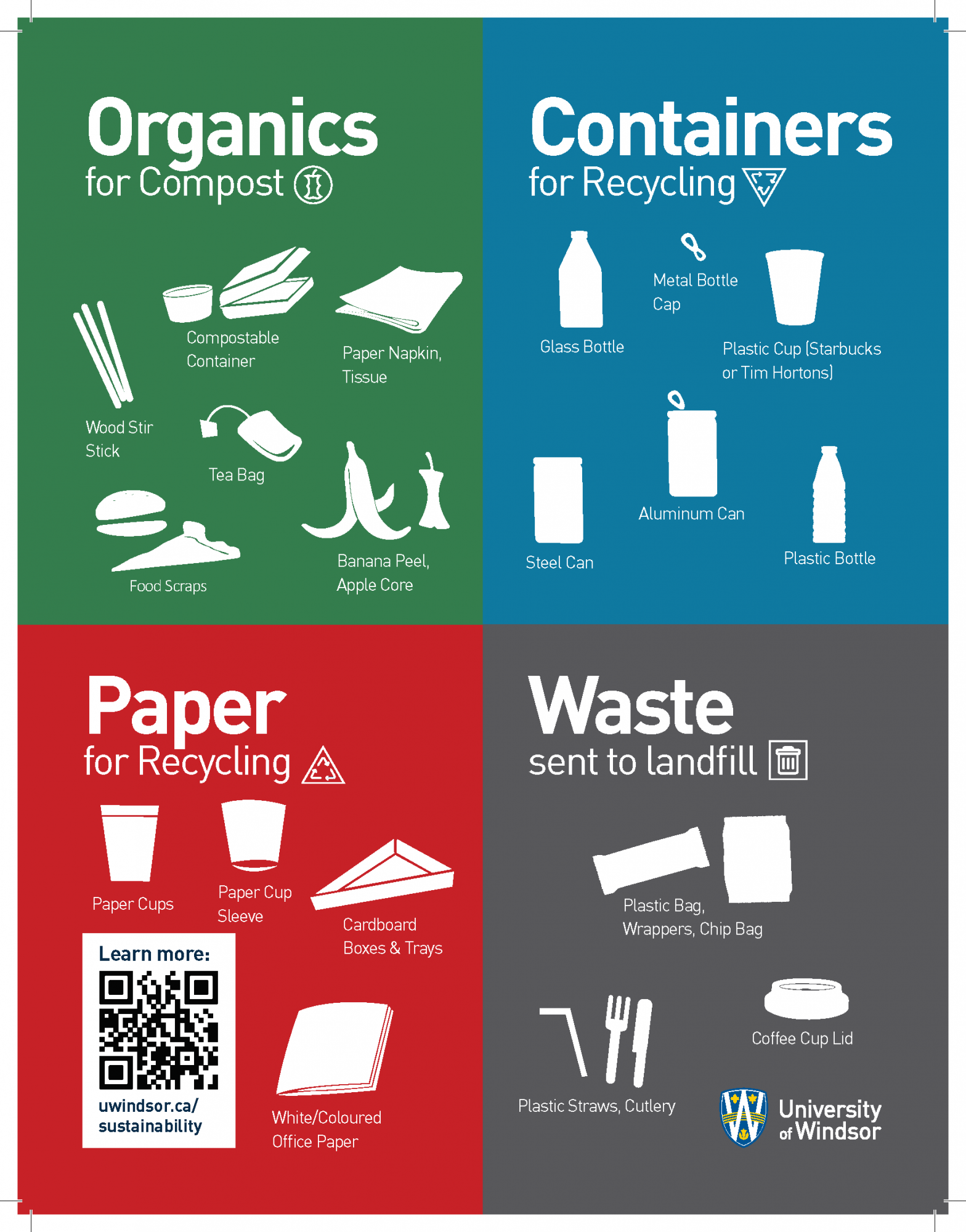As of March 2023, UWindsor began organics collection in all food outlets on campus.
Locations currently participating:
- Crocodile Grill in Vanier Hall
- CAW kitchen
- CAW waste sorting station (near living wall)
- Whamburger
- Coffee outlet at Toldo Lancer Centre
Items accepted in the organics (green) bin include, but not limited to:
-
Food scraps (e.g., fruit and vegetable peels, coffee grounds, tea bags)
-
Plant-based compostable materials (e.g., compostable cutlery, plates, and cups)
-
Paper products (all items listed in “paper” are accepted here)
- NO: Plastic, Metal, Aluminum
Acceptable items that belong in the Paper (red) stream:
-
Office paper (e.g., white and colored paper, envelopes)
-
Newspapers and magazines
-
Cardboard boxes (flatten boxes before recycling)
-
Paper napkins and tissues (can also go in organics if they are food-soiled)
-
Tim Hortons Cup & Starbucks paper cup
-
Coffee Cup paper sleeve
Items that are acceptable in the Bottles and Cans (Blue) stream:
-
Aluminum cans
-
Steel cans (e.g., soup cans, canned vegetables)
-
Glass bottles and jars (all colors)
-
Plastic bottles and containers (e.g., plastic water bottles, detergent bottles)
-
Note: Check for recycling symbols and follow local recycling guidelines as some plastics may not be recyclable.
Click the following links to find the closest collection bin for other material collected on campus, in hopes of keeping them out of the landfill.
Battery and Cellphone Collection Bins
Ink Toner & Printer Cartidge Recycling locations
Other specific recycling collections
These collection programs are coordinated by the Chemical Control Centre.
Textbooks (not UWindsor Libary books) are collected in labeled 'Textbook for Change' bins at CEI, Odette, Toldo Health Education Centre, Windsor Armories, JEC, HK, and CAW. This helps stock university libraries across East Africa.
There are a vairety of community collection programs, from clothing donations, eye glass collection, books and reusable bags to name a few. Check out YQGgreen Recycling Resource page to learn more.
Accessible tactile mats (WasteFinder) are now located in CAW (as of Fall 2023).
These tactile signage indicators are placed on the ground surrounding a waste container. It enables individuals of all abilities to independently and effectively locate waste containers and to dispose of their waste in the appropriate stream. This innovative produce was created by an undergraduate student at Laurier, Hillary Scanlon, making campus waste and recycling units accessible to people with vision loss.
WasteFinder has two essential components, the Vicinity Indicator and the Stream Indicator. The Vicinity Indicator lets users know when they are in the vicinity of a waste container, while the Stream Indicator lets users know which waste stream they are directly in front of.
- Vicinity Indicator: The Vicinity Indicator surrounds the surface area around the waste disposal unit. It lets individuals know when they’re within a certain distance of the bins. It can be felt distinctly underfoot even when using mobility devices.
- Stream Indicators: Once within the vicinity of the waste disposal unit, the Stream Indicators help the user determine where to place their waste using raised symbols on the floor, so the user never needs to touch a waste disposal unit in search of braille or other tactile indicators or get close enough to the waste disposal unit to read its signs. The Stream Indicators also use simple shapes that are easily detected underfoot or through a mobility device.
As the university works to build a more safe, inclusive, accessible, and sustainable space, we are thrilled to announce the integration of WasteFinder into the CAW space (installed September 2023). We would like to thank our colleagues at Wilfred Laurier University's Sustainability Office for allowing us to collaborate on this innovative initiative.
Further information along with graphics will be updated soon.
For more information on StilSolutions- Sustainability Through An Inclusive Lens visit: https://stilsolutions.ca/
With new legislation, City of Windsor residential waste will no longer be collected by EWSWA as of Aug 28th, 2024, but will be collected by Circular Materials. Refer to Circular Materials-Windsor for more information.
Check out the City of Windsor's recycling guide (2023-2024)!
Reducing Waste
The daily operations of an institution frequently produce extra and unneeded resources, food, and energy. To become a more environmentally friendly institution and thereby lessen our negative impact on the environment, it is crucial to reduce this waste.
Ways to Reduce the Waste

Unsure where a waste item belongs? Check out the City's "What goes Where?" online directory to determine the correct recycling and disposal information for specific items.
Waste Sorting
Waste sorting on campus is becoming standardised by the University of Windsor, making it simpler than ever to determine where waste and recycling goes.


